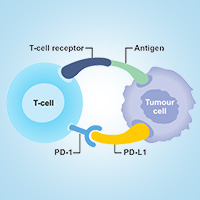Immune checkpoints are regulators of immune activation by regulating the antigen recognition of T cell receptor (TCR) in the process of immune response. They play a key role in maintaining immune homeostasis and preventing autoimmunity.
Based on the different role for immune activation, immune checkpoints are divided into two types: co-stimulatory immune checkpoints and co-inhibitory immune checkpoints.
Co-stimulatory immune checkpoints refer to one kind of immune checkpoint which can stimulate immune progress, such as CD28, ICOS, and CD137.
On the contract, co-inhibitory immune checkpoints play a negative role to immune progress. They inhibit immune progress, such as PD1, CTLA-4, and VISTA.
In cancer, immune checkpoint mechanisms are often activated to suppress the nascent anti-tumor immune response. This has led to the development of several checkpoint inhibitor antibody drugs that are currently being tested in clinical trials or have been approved for a number of cancers.



